 Tribune Media walked away from its $3.9 billion dollar merger agreement with Sinclair Broadcast Group this morning, and announced it would sue Sinclair for $1 billion for its conduct trying to get the deal approved, including withholding information and deceiving regulators.
Tribune Media walked away from its $3.9 billion dollar merger agreement with Sinclair Broadcast Group this morning, and announced it would sue Sinclair for $1 billion for its conduct trying to get the deal approved, including withholding information and deceiving regulators.
The merger deal was controversial from the moment it was announced, pairing up Sinclair’s 192 stations with Tribune’s 42 TV stations in 33 markets, including well-known stations like WGN in Chicago and WPIX in New York. Sinclair was already the nation’s top TV station owner, and to acquire more stations, Sinclair would have to get TV ownership limits eased, something coincidentally provided by FCC Chairman Ajit Pai, who suddenly announced an interest in bringing back a “discount” on ownership caps for stations broadcasting on the UHF band. That policy was dropped after the country moved to digital over-the-air broadcasting, which negated the perception that UHF channels were less desirable and held lower value than lower VHF channels because of reception quality.
Sinclair’s Long History of Partisan Politics
 Sinclair, unlike other TV station owners, also has a long history of being active in partisan politics, airing programming in favor of conservatives and openly advocating for the agendas of the Bush and Trump Administrations. Its long-standing policy to require its stations to air corporate-produced news segments and commentaries during local newscasts has irritated local newsrooms for years, but as the number of Sinclair-owned stations has grown, the practice was eventually exposed with a viral video depicting an uncomfortable collection of anchors from dozens of Sinclair stations decrying “fake news.”
Sinclair, unlike other TV station owners, also has a long history of being active in partisan politics, airing programming in favor of conservatives and openly advocating for the agendas of the Bush and Trump Administrations. Its long-standing policy to require its stations to air corporate-produced news segments and commentaries during local newscasts has irritated local newsrooms for years, but as the number of Sinclair-owned stations has grown, the practice was eventually exposed with a viral video depicting an uncomfortable collection of anchors from dozens of Sinclair stations decrying “fake news.”
In 2016, Sinclair aired 1,723 stories about the Huntsman Cancer Institute in Utah on 64 of its stations. Most were designed to look like one or two minute news stories, although Sinclair also produced a 30-minute show about the facility. What viewers were never told is that the stories were paid for by the Huntsman Cancer Foundation. In December, the FCC fined Sinclair a record-breaking $13.3 million for failing to disclose the story’s sponsor. The Democratic minority on the Commission called that a slap on the wrist and wanted the maximum fine of $82 million levied on Sinclair for its egregious and flagrant violation of FCC rules.
Sinclair’s past run-ins and controversies guaranteed its merger deal with Tribune would receive special scrutiny. The documents attached to the lawsuit filed this morning reveal Tribune got quickly upset with Sinclair’s hardball lobbying, accusing Sinclair of brazenly flouting the FCC’s rules and setting up the merger for failure.
In the end, even Sinclair’s apparent ally Ajit Pai distanced himself from the TV station owner in July, suddenly advocating the merger deal be forwarded to an administrative law judge for review, a sure sign the merger was in serious trouble with regulators.
How America’s largest local TV owner turned its news anchors into soldiers in Trump’s war on the media: https://t.co/iLVtKRQycL pic.twitter.com/dMdSGellH3
— Deadspin (@Deadspin) March 31, 2018
Tribune Takes Sinclair to Court
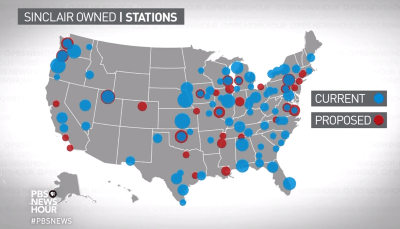 This morning, Tribune officially pulled the plug on the merger.
This morning, Tribune officially pulled the plug on the merger.
“Our merger cannot be completed within an acceptable time frame, if ever,” Tribune Media chief executive Peter Kern said in a statement. “This uncertainty and delay would be detrimental to our company and our shareholders. Accordingly, we have exercised our right to terminate the merger agreement, and, by way of our lawsuit, intend to hold Sinclair accountable.”
That accountability will come in the form of its lawsuit that includes revealing documents about Sinclair’s behavior during the merger process, which includes allegations Sinclair recklessly withheld information and deceived the FCC and Justice Department about the transaction. If true, that could threaten Sinclair’s fitness to hold FCC licenses for its TV stations.
“From virtually the moment the Merger Agreement was signed, Sinclair repeatedly and willfully breached its contractual obligations in spectacular fashion,” Tribune said in its lawsuit. “In an effort to maintain control over stations it was obligated to sell if advisable to obtain regulatory clearance, Sinclair engaged in belligerent and unnecessarily protracted negotiations with DOJ and the FCC over regulatory requirements, refused to sell stations in the ten specified markets required to obtain approval, and proposed aggressive divestment structures and related-party sales that were either rejected outright or posed a high risk of rejection and delay – all in the service of Sinclair’s self-interest and in derogation of its contractual obligations.”
Tribune claims Sinclair only favored its own financial interests, not the obligations it had to Tribune to get the merger deal approved as quickly as possible. Tribune also accused Sinclair of threatening, insulting, and misleading regulators to keep control over stations it was obligated to sell.
The Sinclair Broadcast Group has come under fire following the spread of a video showing anchors at its stations across the United States reading a script criticizing “fake” news stories. (8:03)
“Sue me.”
Tribune’s executives gradually became more alarmed the more Sinclair negotiated with regulators, claiming Sinclair antagonized officials at the Justice Department. Tribune notes the assistant attorney general of the antitrust division got an earful from Sinclair, lecturing the official that he “completely misunderstand[ood]” the broadcast industry and was “more regulatory” than any recent predecessor.
When Sinclair was cornered by the Department of Justice over demands for station divestitures, the company summarized its position in two words: “sue me.”
Tribune pointed out the Justice Department was prepared to accept the merger with the appropriate stations being sold to new owners, but Sinclair balked. After a series of schemes were suggested to partly divest the stations, Tribune saw the protracted negotiations as unnecessary and imprudent. The agendas of both companies were radically different. Tribune wanted Sinclair to do whatever the FCC and Justice Department insisted be done, to get the deal done quickly. Sinclair wanted the deal and a way to maintain control, even indirectly, over almost every station involved in the deal. Tribune began threatening to sue Sinclair if it did not agree to the Justice Department’s terms.

Tribune’s growing unease with Sinclair’s behavior culminated in this email exchange between Tribune and Sinclair executives in late December, 2017.
Sinclair finally relented in February, 2018, but only partially. Exasperated Tribune executives were stunned as Sinclair now proposed to sell stations to third parties that maintained “significant ties to Sinclair’s executive chairman,” David Smith, or his family.
“Sinclair would effectively control all aspects of station operations, including advertising sales and negotiation of retransmission agreements with cable and satellite operators,” Tribune said in its lawsuit. “Under these proposed arrangements, Sinclair would continue to reap the lion’s share of the economic benefits of the stations it was purportedly ‘divesting’ and would have an option to repurchase the stations in the future.”
“Sinclair fought, threatened, insulted, and misled regulators in a misguided and ultimately unsuccessful attempt to retain control over stations that it was obligated to sell,” the lawsuit concludes.
The country’s largest owner of local TV stations, the Sinclair Broadcast Group, which reaches over a third of homes across the nation, wanted to get even bigger by merging with the Tribune Media Company. Sinclair is raising concerns among media watchers because of its practice of combining news with partisan political opinion. William Brangham reports for PBS Newshour. (8:58)


 Subscribe
Subscribe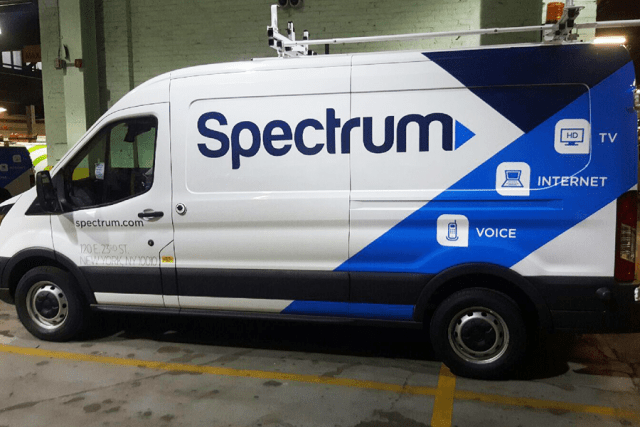
 For the near term, Spectrum customers won’t notice a thing. Even if the PSC was not taken to court, Charter has 60 days to file a six month transition plan, making the earliest date to waive Spectrum goodbye is sometime in early 2019.
For the near term, Spectrum customers won’t notice a thing. Even if the PSC was not taken to court, Charter has 60 days to file a six month transition plan, making the earliest date to waive Spectrum goodbye is sometime in early 2019.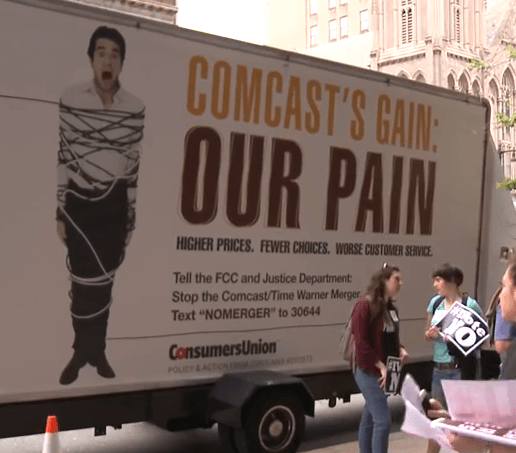
 A. Consumer satisfaction surveys suggest the answer is yes. Comcast is routinely rock bottom in customer satisfaction, customer service, pricing, and service options. Its 1 TB data cap on internet service has not yet reached many of its northeastern customers, but most observers expect it eventually will. In contrast, Charter has agreed not to impose data caps for up to seven years after its 2016 merger. But Comcast has delivered more frequent broadband speed upgrades and has more advanced set-top boxes and infrastructure.
A. Consumer satisfaction surveys suggest the answer is yes. Comcast is routinely rock bottom in customer satisfaction, customer service, pricing, and service options. Its 1 TB data cap on internet service has not yet reached many of its northeastern customers, but most observers expect it eventually will. In contrast, Charter has agreed not to impose data caps for up to seven years after its 2016 merger. But Comcast has delivered more frequent broadband speed upgrades and has more advanced set-top boxes and infrastructure. A. Altice, which does business as Cablevision or Optimum, is New York’s other big cable operator, providing service exclusively downstate. Altice had aggressive plans to become a big player in the U.S. cable business, but its acquisition dreams were halted by shareholders, concerned about the European company’s already staggering debt, run up acquiring other companies. Altice is currently scrapping Cablevision’s existing Hybrid Fiber Coax infrastructure and replacing it with direct fiber to the home service, which offers improved service. But the company charges a lot for its advanced set-top box, has bloated modem rental fees, and is notorious for vicious cost-cutting, which stalled service improvements at its mobile and cable companies in France and raised a lot of controversy among employees.
A. Altice, which does business as Cablevision or Optimum, is New York’s other big cable operator, providing service exclusively downstate. Altice had aggressive plans to become a big player in the U.S. cable business, but its acquisition dreams were halted by shareholders, concerned about the European company’s already staggering debt, run up acquiring other companies. Altice is currently scrapping Cablevision’s existing Hybrid Fiber Coax infrastructure and replacing it with direct fiber to the home service, which offers improved service. But the company charges a lot for its advanced set-top box, has bloated modem rental fees, and is notorious for vicious cost-cutting, which stalled service improvements at its mobile and cable companies in France and raised a lot of controversy among employees. A. Officially, the PSC has ordered Charter to continue abiding by the 2016 Merger Order and its deal commitments. The state will likely continue to fine Charter if it keeps missing rural broadband rollout targets until a court stops them or the company leaves. Charter will probably continue rural broadband expansion to show good faith. Charter has met its merger obligations related to speed increases, so it is not currently out of compliance. But a legal challenge offers the opportunity for a third-party judge to suspend or modify existing deal commitments, at least temporarily. It is unlikely Charter will want to invest large sums in its cable systems if it believes it will lose its case in court. The timetable for an upgrade to 200 Mbps Standard speed will likely now occur on a regional basis. The northeast division will still likely activate these speeds across multiple cities in the region sometime this summer, especially in places where it faces competitive pressure. The 300 Mbps upgrade in 2019 is more likely to be impacted by any forthcoming legal action.
A. Officially, the PSC has ordered Charter to continue abiding by the 2016 Merger Order and its deal commitments. The state will likely continue to fine Charter if it keeps missing rural broadband rollout targets until a court stops them or the company leaves. Charter will probably continue rural broadband expansion to show good faith. Charter has met its merger obligations related to speed increases, so it is not currently out of compliance. But a legal challenge offers the opportunity for a third-party judge to suspend or modify existing deal commitments, at least temporarily. It is unlikely Charter will want to invest large sums in its cable systems if it believes it will lose its case in court. The timetable for an upgrade to 200 Mbps Standard speed will likely now occur on a regional basis. The northeast division will still likely activate these speeds across multiple cities in the region sometime this summer, especially in places where it faces competitive pressure. The 300 Mbps upgrade in 2019 is more likely to be impacted by any forthcoming legal action.

 Last week, AT&T announced its intention to abandon an appeal of a decision of the 9th Circuit Court of Appeals granting the Federal Trade Commission the right to continue its lawsuit against AT&T for speed throttling its “unlimited data” wireless customers.
Last week, AT&T announced its intention to abandon an appeal of a decision of the 9th Circuit Court of Appeals granting the Federal Trade Commission the right to continue its lawsuit against AT&T for speed throttling its “unlimited data” wireless customers.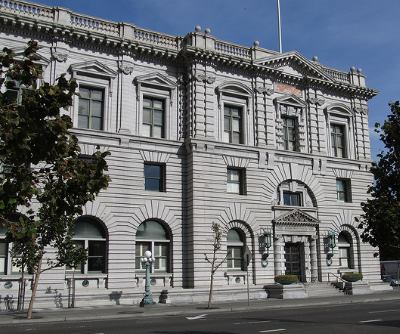
 While AT&T publicly expressed confidence about its appeal right up to the day it abandoned it,
While AT&T publicly expressed confidence about its appeal right up to the day it abandoned it, 
 The wireless industry’s largest lobbying group, CTIA-The Wireless Association,
The wireless industry’s largest lobbying group, CTIA-The Wireless Association, 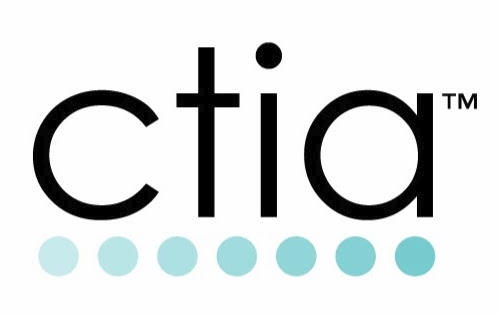 The CTIA doesn’t dwell on the real world impact of its member companies, with revenues well into the billions of dollars, simply absorbing the 36¢ a month charged to their Utah customers as a cost of doing business. Instead, the lawsuit argues Utah cannot apply USF surcharges in a way that is “inconsistent with the requirements related to the federal universal service Lifeline program.”
The CTIA doesn’t dwell on the real world impact of its member companies, with revenues well into the billions of dollars, simply absorbing the 36¢ a month charged to their Utah customers as a cost of doing business. Instead, the lawsuit argues Utah cannot apply USF surcharges in a way that is “inconsistent with the requirements related to the federal universal service Lifeline program.”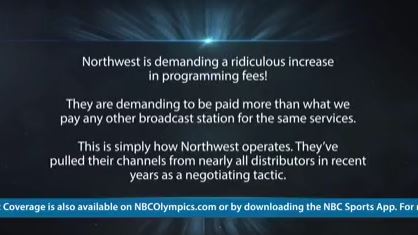 Charter Communications is taking the city of El Centro, Calif., to federal court for interfering in a dispute between Spectrum and a local TV station owner that has resulted in two stations being blacked out on the local cable system for nearly three months.
Charter Communications is taking the city of El Centro, Calif., to federal court for interfering in a dispute between Spectrum and a local TV station owner that has resulted in two stations being blacked out on the local cable system for nearly three months. “Northwest’s pulling its authorization for Charter to carry its broadcast signals is not a ‘service interruption’ within the meaning of the City Code provisions in question,” Charter argued in its lawsuit. “Even if it were, while El Centro demands that Charter ‘cure’ its alleged violations, the only means for Charter to do so is to finalize a retransmission agreement with Northwest. The City’s citations are thus intended to pressure Charter to accept Northwest’s unreasonable terms by imposing fines and intentionally damaging Charter’s reputation and harming its goodwill and relationships with its existing and prospective customers.”
“Northwest’s pulling its authorization for Charter to carry its broadcast signals is not a ‘service interruption’ within the meaning of the City Code provisions in question,” Charter argued in its lawsuit. “Even if it were, while El Centro demands that Charter ‘cure’ its alleged violations, the only means for Charter to do so is to finalize a retransmission agreement with Northwest. The City’s citations are thus intended to pressure Charter to accept Northwest’s unreasonable terms by imposing fines and intentionally damaging Charter’s reputation and harming its goodwill and relationships with its existing and prospective customers.” “Rather than negotiating in good faith like all other parties would do and what the law requires, Charter has taken a ‘take it or leave it’ approach,” added Brady. “In an effort this week to get this back on track, Northwest submitted a new proposal to Spectrum. Spectrum’s representative communicated that they really wanted to get this resolved, but would not counter Northwest’s proposal and would not respond at all in writing. Odd behavior for a company that claims to be negotiating in good faith. It appears that Charter would rather bully a small municipality than to engage in a good faith negotiation.”
“Rather than negotiating in good faith like all other parties would do and what the law requires, Charter has taken a ‘take it or leave it’ approach,” added Brady. “In an effort this week to get this back on track, Northwest submitted a new proposal to Spectrum. Spectrum’s representative communicated that they really wanted to get this resolved, but would not counter Northwest’s proposal and would not respond at all in writing. Odd behavior for a company that claims to be negotiating in good faith. It appears that Charter would rather bully a small municipality than to engage in a good faith negotiation.”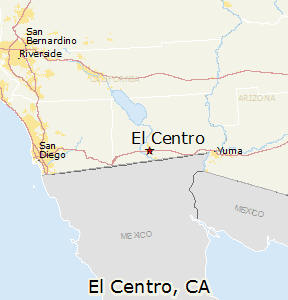 “Despite the fact the fee is itemized and justified as a pass-through, Charter did not eliminate or reduce that fee, even though it was no longer incurring costs associated with carriage of … at least two network affiliates,” Crescent City officials told the FCC.
“Despite the fact the fee is itemized and justified as a pass-through, Charter did not eliminate or reduce that fee, even though it was no longer incurring costs associated with carriage of … at least two network affiliates,” Crescent City officials told the FCC.